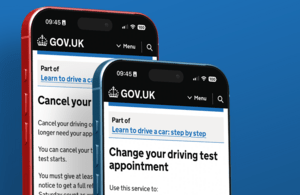With anxiety being the central theme of this year’s Mental Health Awareness week (15th to the 21st May), it’s important to be aware of what anxiety is and how it can impact your daily life.
In 2021/2 anxiety contributed to 51% of all work-related ill health cases.[1] Whilst this is a concerning figure, it highlights that raising awareness of how to manage anxiety should be a top priority in every workplace, as on average, we spend 36 hours a week working.
Anxiety can be defined as a feeling of unease, such as worry or fear, that can be mild or severe. Experiencing anxiety is a normal part of life and can naturally occur at work in scenarios such as preparing for a job interview or presentation.
To raise awareness of the importance of mental health at work, the learning experts at online training provider High Speed Training have shared some tips to help identify and effectively manage anxiety in the workplace.
Dr Richard Anderson, Head of Learning and Development at High Speed Training, said:
“Whilst anxiety at work can sometimes feel unmanageable, its symptoms can be effectively controlled. It’s important to manage your anxiety as, if left untreated, it can have a huge impact on you and your career.
The first step in managing your anxiety is to start tracking the moments in your work day that cause the most anxiety, as this will help you discover what your triggers are. Being able to put a name to the feelings you’re experiencing can often be a great help in discovering treatments to help manage your symptoms.”
Take breaks when you need to
Stepping away from your work and the workplace environment to clear your head can help to refresh your mindset and help you to refocus. Try using deep-breathing techniques, go for a walk (preferably in nature), or consider using some holiday time for a proper break.
Open up
Dr Anderson continues: “Understandably, asking for help at work can feel difficult. Many cases of ill mental health aren’t reported to HR or managers and therefore can go under the radar.
“Discussing your anxiety with someone you trust at work and having someone who understands what you’re experiencing can be comforting and help ease some of its symptoms.”
Adopt healthy habits
“Self care is essential to managing anxiety, as not looking after yourself can compound your symptoms. Getting enough sleep, eating healthily, and exercising are proven to have a hugely positive impact on the mind as well as improving physical health.”
Plan your work
Take time to plan out the upcoming week so that you know what’s coming in terms of workload. This will help to give you a sense of control over your time which can ease feelings of anxiety. Additionally, breaking tasks down into smaller chunks can make them seem less overwhelming and more easily managed.
Dr Anderson concludes: “The more we understand about anxiety, the better we will be at tackling its symptoms. Being aware of how, when, and where your mental health might suffer is vital to being able to manage your own anxiety, and provide effective support for others experiencing it.”
If you’re struggling with anxiety or are concerned about your mental health, please reach out to a medical professional.For more information on managing anxiety and mental health, please visit the High Speed Training Hub, containing hundreds of articles and resources created by their learning experts.

















